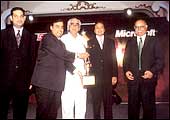 |
| India's best managed company: (From left)
Microsoft's Rajiv Kaul, RIL's Chairman Mukesh Ambani, FM Jaswant
Singh, RIL's Vice Chairman Anil Ambani, and India Today Group's
Editorial Director Prabhu Chawla |
India's
best managed company: Reliance it is (From left) Microsoft's Rajiv
Kaul, RIL's Chairman Mukesh Ambani, FM Jaswant Singh, RIL's Vice
Chairman Anil Ambani, and India Today Group's Editorial Director
Prabhu Chawla in the end, there weren't enough tables at the ballroom
of the Taj Mahal hotel in Mumbai. On the evening of June 9, India
Inc. turned out in numbers to celebrate excellence. The occasion
was the awards ceremony of the first Business Today Best Managed
Company in India study. Present were representatives from the 16
finalist companies. The brothers Ambani from Reliance, Nandan Nilekani
of Infosys, Dr. Reddy's Anji Reddy, Sun Pharma's Dilip Shanghvi,
Cadbury India's Bharat Puri, Moser Baer's Deepak Puri, Gujarat Ambuja's
Narottam Sekhsaria making a rare public appearance, Asian Paints'
Ashwin Dani, Britannia's Nikhil Sen, TVS Motor's C.P. Raman, HPCL's
M.B. Lal, pleased to represent the only PSU receiving an award,
and ICICI Bank's Kalpana Morparia. Dealmeisters Ashok Wadhwa of
Ambit and Nimesh Kampani of J.M. Morgan were there to cheer the
winners, as were ONGC's Subir Raha, Bharti's Sunil Mittal, KPMG's
Ian Gomes, Bank of America's Vishwavir Ahuja, Mudra's Madhukar Kamath,
Bajaj Electricals' Shekhar Bajaj, Boston Consulting Group's Arun
Maira, and Duncans' G.P. Goenka.
| Snapshots From Business Today Best
Managed Company Awards Night in Mumbai |
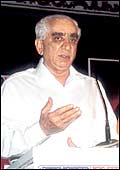 |
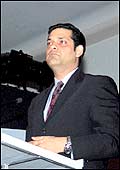 |
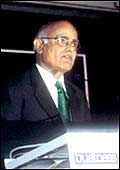 |
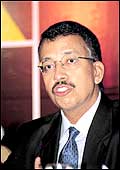 |
| The evening speakers: (From
left) FM Jaswant Singh, Microsoft India's MD Rajiv Kaul, India
Today Group's Editorial Director Prabhu Chawla, and A.T. Kearney's
Chairman C. Srinivasan |
Much back-slapping was in evidence as 15 of
the finalists made their way to the stage to receive awards from
India's Finance Minister Jaswant Singh (assisted, in turn, by event
knowledge partner A.T. Kearney's Chairman Chandra Srinivasan, Business
Today's Editor Sanjoy Narayan, and Business Today's Publisher Ashish
Bagga). Then, it was time to announce and honour the winner, Reliance
Industries. Chairman Mukesh and Vice Chairman Anil Ambani received
the award from the Finance Minister, event presenter Microsoft's
Managing Director Rajiv Kaul, and India Today Group Editorial Director
Prabhu Chawla. Accepting the award, Mukesh dedicated it to his father,
the late Dhirubhai Ambani. A visibly emotional Anil held the award
up as he exclaimed, ''Papa, this is for you.''
Earlier, in his keynote address, FM Jaswant
Singh had expressed his desire to see more Indian companies figuring
among the ranks of the best-managed and promised India Inc. all
support from the government in its quest for global competitiveness.
We hope to see more winners next year.
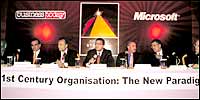 |
| The Future Gazers: (From left) ONGC's
CMD Subir Raha, Bharti Enterprise CEO Sunil Mittal, RIL Vice
Chairman Anil Ambani, BT's Editor Sanjoy Narayan, HLL Chairman
M.S. Banga, A.T. Kearney Chairman C. Srinivasan, & BCG Chairman
Arun Maira |
BT Brainstorming
India Inc.'s finest on management.
The New Paradigm: What
They Said...
The 21st century
corporation, said Anil Ambani, would still need to dream big and
command the loyalty of people who could turn it into reality. Indeed,
as M.S. Banga said, the New Paradigm needs leadership that's about
envisioning and making breakthroughs, not about 'administration'
as understood in terms of hierarchical control. But, in the context
of modern day uncertainty, it also needs "external orientation"
in general and multiple sensors-to make one's way around in darkness-in
particular.
 |
 |
 |
 |
 |
 |
"Dream big,
get others to buy into the dream, and find people to execute
that dream"
Anil Ambani,
vice-chairman, Reliance Industries Ltd |
"What's the key watchword as we transit
into the 21st century? It is uncertainty" M.S.
Banga, CMD, Hindustan Lever |
"You have power because of the alliances,
partnerships, skills and tech you can bring" C.
Srinivasan, Chairman, A.T. Kearney |
"If you can master IT for the customer's
benefit, you can create the differentiation" Sunil
Mittal, CEO, Bharti Enterprises |
"Globalisation means that we talk
rupees and dollars and euros, and how they interact"
Subir Raha, CMD,
ONGC |
"We get blind spots and don't realise
there are some things that we don't know"
Arun Maira, CEO,
Boston Consulting Group |
Chandra Srinivasan emphasised the need to orchestrate
diverse resources, even co-opting customers, perhaps even in organisational
redesign. Sunil Mittal urged businesses to institutionalise leadership
to reduce dependence on individuals, and to leverage it for customer
orientation. Subir Raha pondered the challenge of maintaining 'personal
touch' in a tech-wired environment. And Arun Maira drew attention
to the dangers of not knowing "what we don't know". Any
solutions? Among the answers: honesty, an open learning culture
and hiring smarter people.
Transparency Tools: What They Said...
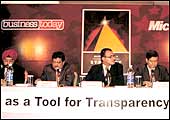 |
| Transparency Troubadours: (From left)
A.T. Kearney's VP Devinder Chawla, Infosys CEO Nandan Nilekani,
BT's Deputy Editor R. Sukumar, Karnataka Government's IT &
BT Secretary Vivek Kulkarni |
Information technology
is a transparency tool, said Rajiv Kaul, by virtue of being a "common
denominator" in virtually everything to do with knowledge management
and harnessing human potential. It's highly effective, so long as
common standards are established. The possibilities are vast, said
Vivek Kulkarni, citing instances of it-enabled transparency in government,
from meritocratic engineering college admissions to the real-time
accounting of public funds.
That it permits greater transparency is beyond
question, said Nandan Nilekani, but the challenge still is to turn
corporations transparent from the perspective of shareholders and
other external regulatory bodies. Here, ethics play a large role.
Mere it usage is not enough, given that "Enron was one of the
world's most sophisticated users of it". Still, added Devinder
Chawla, transparency in the very act of information aggregation
and dissemination can do wonders for business effectiveness.
But could it transform businesses that operate
as information hierarchies? "Well, I think there's no question
that it tends to flatten hierarchies and destabilise the controls
that a manager may have over information," said Nilekani, extolling
the virtues of widely accessible single-view data. Kaul, meanwhile,
laid emphasis on the disintermediation effect of it-and the immediacy
of information rather than mere access to it.
|
|
|
|
|
|
"Technologies being
developed will revolutionise the way we access and share information"
Rajiv Kaul,
Managing Director, Microsoft India
|
"Governments are
more transparent than corporates. People can change them if
they want to"
Vivek Kulkarni,
Secretary (IT and Biotech), Government of Karnataka
|
"Without the moral
fibre to ensure that tech is used effectively, tech won't
solve the problem"
Nandan Nilekani, CEO, Infosys
Technologies
|
"We do realize
at times, there has to be some kind of restricted sharing
of information''
Devinder Chawla,
Vice President, A.T. Kearney
|
What about information overload? And can everyone
really have access to all information? Nilekani brought back the
issue of standards, and the need for clarity on what is confidential
and what not. As for entrusting people with ever-more gigabytes,
"The public is ready for more information", said Kulkarni.
|

